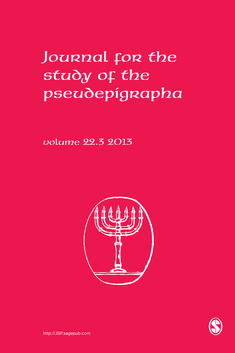
Journal for the Study of the Pseudepigrapha
Scope & Guideline
Navigating the Complexities of Religious Identity
Introduction
Aims and Scopes
- Exploration of Pseudepigraphal Texts:
The journal emphasizes the critical examination of pseudepigraphal writings, including their historical, theological, and literary significance. - Intertextuality and Literary Analysis:
A core focus is on the intertextual relationships between pseudepigraphal texts and other ancient literature, including biblical and non-biblical sources, exploring how these texts influence and reflect cultural narratives. - Historical Contextualization:
Research often situates pseudepigraphal works within their historical contexts, addressing issues of authorship, audience, and socio-political environments that shaped these writings. - Thematic Studies:
The journal encourages thematic studies that investigate pervasive motifs, such as ethics, identity, and divine agency, as they manifest in pseudepigraphal literature. - Cross-Cultural Perspectives:
There is a consistent focus on Jewish literature's interaction with Hellenistic, Roman, and early Christian thought, shedding light on the cross-cultural exchanges of the time. - Methodological Diversity:
The journal publishes works employing various methodologies, including textual criticism, philology, and comparative studies, to enrich the understanding of pseudepigrapha.
Trending and Emerging
- Resurrection and Afterlife Themes:
Recent articles have increasingly addressed concepts of resurrection and afterlife, indicating a growing interest in how these ideas are articulated within pseudepigraphal texts and their implications for understanding ancient beliefs. - Ethics and Moral Philosophy:
There is a rising trend in exploring ethical dimensions and moral philosophies within pseudepigraphal literature, particularly in relation to leadership and governance, reflecting contemporary concerns about these issues. - Cultural and Racial Identity Constructs:
Emerging discussions on race and cultural identity, particularly in texts like 1 Enoch, highlight how ancient narratives contribute to our understanding of early Jewish self-conception and otherness. - Interdisciplinary Approaches:
The journal is increasingly showcasing interdisciplinary research that incorporates methodologies from fields such as sociology, anthropology, and gender studies, broadening the scope of pseudepigraphal studies. - Food and Ritual Studies:
There is a noticeable uptick in papers examining the significance of food and ritual practices within pseudepigraphal contexts, indicating a fresh avenue of inquiry into communal and individual identities.
Declining or Waning
- Traditional Historical Criticism:
There appears to be a reduction in articles solely dedicated to traditional historical-critical approaches, as the journal increasingly embraces more interdisciplinary and innovative methodologies. - Focus on Canonical Text Comparison:
Comparative studies strictly between pseudepigraphal texts and canonical scriptures seem to be less prevalent, with researchers leaning towards broader thematic and cultural analyses. - Static Interpretations of Texts:
There is a noticeable decline in papers that offer static or singular interpretations of texts, as the field moves towards more dynamic, multifaceted analyses that consider various perspectives and contexts. - Limited Engagement with Medieval Reception:
Research focusing on the medieval reception of pseudepigrapha has decreased, possibly due to a shift towards earlier periods and the formative stages of these texts.
Similar Journals

INTERNATIONAL JOURNAL FOR PHILOSOPHY OF RELIGION
Navigating the Intersection of Ethics and BeliefThe INTERNATIONAL JOURNAL FOR PHILOSOPHY OF RELIGION, published by Springer, is a leading journal dedicated to the rigorous exploration of philosophical inquiries related to religion. Since its inception in 1970, the journal has fostered critical discourse and interdisciplinary research, facilitating dialogues on fundamental questions about belief, ethics, and the nature of divinity. With an impressive 2023 Scopus ranking of 189 out of 806 in the Arts and Humanities category, placing it in the top 76th percentile, this journal is recognized for its scholarly impact and relevance in the field. The journal maintains a prestigious standing as a Q1 journal in Philosophy, making it an essential resource for researchers, professionals, and students seeking to engage with contemporary debates and historical perspectives in the philosophy of religion. Although it does not offer open access, the journal's contributions are invaluable for shaping future inquiry and understanding in this vital area of study.
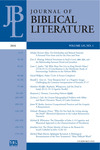
JOURNAL OF BIBLICAL LITERATURE
Exploring the Depths of Scripture and Narrative.The JOURNAL OF BIBLICAL LITERATURE, published by the Société Biblique de Littérature, is a premier academic platform dedicated to the interdisciplinary exploration of biblical texts through the lenses of literature and religious studies. With impressive Scopus rankings—placing it in the top 5% of journals in both Literature and Literary Theory as well as Religious Studies—the journal exemplifies quality and rigor in its scholarship. Despite its lack of open-access options, it is highly regarded for its contributions to scholarly discourse, aiming to enrich understanding of biblical literature within both historical and contemporary contexts. The journal operates within the elite Q1 quartile, underscoring its significance in the field and making it an essential resource for researchers, professionals, and students alike. Conveniently based in the United States, at 825 Houston Mill Rd, Suite 350, Atlanta, GA 30329, the journal is poised to continue impacting the scholarly landscape leading into its converged years from 2002 to 2024.

Bulletin of the John Rylands Library
Cultivating a Deeper Understanding of Libraries and SocietyBulletin of the John Rylands Library is a prominent academic journal published by MANCHESTER UNIVERSITY PRESS that serves as a vital platform for research in the fields of Arts and Humanities and Library and Information Sciences. Since its inception, the journal has contributed to the scholarly discourse surrounding library practices, archiving, and historical studies, making it essential reading for researchers, professionals, and students alike. With an ISSN of 2054-9318 and an E-ISSN of 2054-9326, it offers a rich repository of knowledge, although steeped in a diverse array of subjects, it currently holds a Q4 quartile ranking, reflecting its niche but significant impact within its categories. The journal has undergone various published years, most recently from 2014 to 2023, encompassing thematic articles that bridge theoretical and practical realms. While primarily a subscription-based resource, its authoritative contributions are invaluable for anyone engaged in understanding the evolution of libraries and their impact on society. The Bulletin significantly enhances academic engagement, fostering a deeper appreciation for the interconnectedness of library science and the broader humanities.

Eirene-Studia Graeca et Latina
Empowering Research in Language and ArchaeologyEirene-Studia Graeca et Latina, ISSN 0046-1628, is a prominent academic journal published by the Institute of Classical Studies, Academy of Sciences of the Czech Republic. Focusing on the fields of Classics, Linguistics, and Archaeology, this journal serves as a vital platform for scholarly discourse and research dissemination since its inception in 2002. Although it operates under a traditional access model, the journal has established itself within the academic community, evidenced by its placement in the Q4 category across multiple disciplines in 2023. This includes significant rankings in areas such as Archaeology and Language and Linguistics, where it finds itself within the 27th to 16th percentiles of its respective categories. Eirene aims to foster the advancement of research in the Humanities, providing a rigorous forum for scholars and practitioners interested in classical studies. Its contribution to the academic landscape is essential for those who aspire to explore the depths of ancient languages, cultures, and methodologies, making it a valuable resource for researchers, professionals, and students alike.
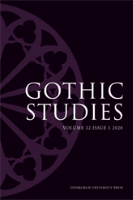
Gothic Studies
Unearthing the Rich Tapestry of Gothic HistoryGothic Studies is a prestigious academic journal published by Edinburgh University Press, dedicated to exploring the rich and nuanced intersections of Gothic literature, history, and culture. With an ISSN of 1362-7937 and an E-ISSN of 2050-456X, the journal aims to provide a critical platform for scholars interested in the Gothic genre from its roots to contemporary interpretations, enriching discussions within the History and Literature and Literary Theory fields. As a testament to its quality, *Gothic Studies* holds significant rankings, being placed in the Q3 quartile for History and Q2 for Literature and Literary Theory in 2023, with Scopus rankings that affirm its contribution to the arts and humanities. Published in the United Kingdom, the journal is notably engaged in disseminating scholarly work that influences academic conversations and educates students and professionals alike. Although it is not an open-access journal, the insights and research published here are invaluable for anyone committed to the ongoing legacy and study of Gothic narratives.

Monteagudo
Exploring the Frontiers of Arts and HumanitiesMonteagudo, published by UNIV MURCIA, is an important academic journal dedicated to the fields of Arts and Humanities, particularly focusing on Literature, Literary Theory, Visual Arts, and Linguistics. Since its inception in 2019, it has aimed to provide a scholarly platform for innovative research and critical discourse within these disciplines. With an ISSN of 0580-6712 and an E-ISSN of 1989-6166, the journal seeks to enhance the visibility of emerging ideas and methodologies, while fostering an inclusive academic dialogue. Although Monteagudo does not currently offer Open Access options, its significance is reflected in its Scopus rankings, which position it within the 14th to 32nd percentile across various categories. With its operations based in the heart of Murcia, Spain, the journal is poised to influence both regional and international scholarly conversations, making it an essential resource for researchers, professionals, and students aiming to expand their understanding of contemporary issues in Arts and Humanities.
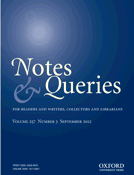
NOTES AND QUERIES
Advancing Knowledge in Literature and Linguistics Since 1849NOTES AND QUERIES is a prestigious journal published by Oxford University Press, dedicated to the exploration of literary studies, linguistics, and library sciences, with a history that extends back to 1849. This journal serves as a pivotal platform for scholars and practitioners to engage in dialogues that illuminate the nuances of text interpretation and linguistic inquiry. With its emphasis on both new research and critical discussion, NOTES AND QUERIES is indexed with notable Scopus rankings, reflecting its substantial contribution to the fields of Linguistics and Literary Theory. Although it currently resides in the Q4 quartile for Library and Information Sciences and Linguistics and Language, and Q3 for Literature and Literary Theory as of 2023, it remains a vital resource for both emerging and established scholars aiming to deepen their understanding of cultural and textual contexts. While the journal is not open access, it continues to foster an environment for scholarly collaboration and knowledge dissemination, making it an essential read for anyone invested in the arts and humanities.

E-Scrita-Revista do Curso de Letras da UNIABEU
Igniting Passion for Language and Literary InnovationE-Scrita - Revista do Curso de Letras da UNIABEU is a distinguished open-access journal dedicated to the field of Linguistics and Literature, published by CENTRO UNIV UNIABEU. Since its inception in 2010, this journal has provided a platform for the dissemination of innovative research and scholarly articles, particularly focusing on the Portuguese language and literature. With its location in Nilópolis, Rio de Janeiro, Brazil, E-Scrita serves as a vital resource for researchers, professionals, and students eager to engage with contemporary issues and advances in the study of linguistics, literary theory, and cultural studies. The journal is committed to promoting academic dialogue and fostering a deeper understanding of literary practices and linguistic phenomena, making it an essential reading for anyone involved in the humanities.
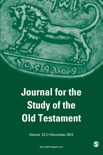
Journal for the Study of the Old Testament
Fostering Dialogue in Religious ScholarshipJournal for the Study of the Old Testament, published by SAGE PUBLICATIONS LTD, is a preeminent peer-reviewed journal dedicated to advancing the field of religious studies, particularly the scholarly investigation of the Old Testament. With its ISSN of 0309-0892 and E-ISSN 1476-6728, the journal has been a vital resource for researchers since its inception in 1976 and continues to deliver cutting-edge scholarship through 2024. Renowned for its rigorous academic standards, the journal has achieved a prestigious Q1 ranking in Religious Studies, positioning it among the top quartile of academic journals in this field. It holds a commendable 75th percentile ranking in the Scopus database, highlighting its impact and relevance in contemporary discourse. Addressed from its United Kingdom base at 1 Olivers Yard, 55 City Road, London EC1Y 1SP, the journal features a comprehensive exploration of theological themes, literary analyses, and historical contexts, aimed at researchers, professionals, and students alike. While access options may vary, the journal remains an indispensable platform for fostering scholarly dialogue and disseminating innovative ideas within the discipline.

BIBLICA
Fostering Scholarly Dialogue on Sacred WritingsBIBLICA is a prestigious academic journal devoted to the study of biblical texts, their historical contexts, and theological implications. Published by PEETERS in Italy, this journal has made significant contributions to the field of Religious Studies since its inception, achieving a commendable Q3 rank in the current category quartiles for 2023. With an ISSN of 0006-0887, BIBLICA engages a diverse readership, providing a platform for scholarly articles that address both contemporary and historical issues related to biblical literature. Although it does not offer open access, its reputation and rigorous peer-review process ensure that each publication is of high scholarly merit. With convergence spanning from 2002 to 2023 and Scopus rankings placing it at #341 out of 644 in Arts and Humanities, BIBLICA serves as an essential resource for researchers, professionals, and students seeking insights into biblical studies and its myriad implications in the modern world.